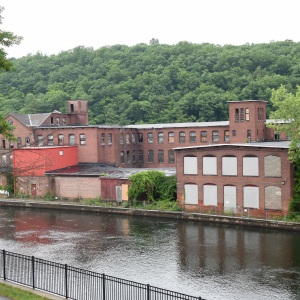BlueWave files appeal of Northfield Planning Board’s solar array denial

| Published: 02-25-2025 3:00 PM |
BOSTON — BlueWave Solar is appealing the Northfield Planning Board’s unanimous denial of a special permit for a second proposed project on Pine Meadow Road, claiming the rejection “exceeded the board’s authority, was based on a legally untenable ground, [and] was arbitrary and capricious,” according to documents filed with Land Court.
After five public hearings and a four-and-a-half-hour meeting on Dec. 19, the Planning Board unanimously denied BlueWave Solar’s special permit application seeking to construct a 2.29-megawatt agrivoltaic solar array on a 16.1-acre parcel of land on Pine Meadow Road, citing flooding hazards, decreased property values resulting from the view being ruined and its misalignment with Northfield’s rural character. BlueWave Solar had previously gained approval in 2021 to construct a three-array, 26,000-panel, 10.9-megawatt project on the same road.
“The benefits do not outweigh the hazards. Installing hazardous materials within a floodplain, and an overflow area utilized by FirstLight Northfield Mountain Pumped Hydro Storage Station for flooding with water and debris, presents too great a danger to the community members that live within the area,” the Planning Board’s decision reads. “It could potentially destroy, through debris or contamination, sensitive habitat and prime farmland that the installation would be occupying. Once that area is contaminated, it cannot be reclaimed.”
BlueWave Solar, however, alleges those reasons are “insufficient as a matter of law to support the denial of a special permit,” as there was “no evidence — let alone substantial evidence” to support speculation on flooding. The other reasons for denial are “preempted by state law, unsupported by substantial evidence and/or are arbitrary and capricious,” according to the company’s complaint, which was filed by attorneys Tad Heuer and Jesse Alderman.
The complaint, filed with Land Court on Feb. 18, asks Judge Kevin T. Smith to declare that the Planning Board overstepped its authority, annul the decision, issue the special permit without sending the matter back to the Planning Board, and award costs and reasonable attorneys’ fees to the applicant.
“A remand would reward the board’s improper behavior,” Heuer and Alderman wrote, “giving it the opportunity to engage in further pretextual mischief and further delay of the construction of an essential clean energy project.”
Northfield Town Counsel Jeffrey Blake said the Planning Board’s decision is “self-explanatory,” as there are serious health, safety and welfare concerns with the project’s proposal of placing a solar array in a floodplain.
“The board’s well-reasoned decision should be upheld by the court,” Blake said in an email, “and the town will defend the board’s decision.”
Article continues after...
Yesterday's Most Read Articles
 Northfield man dies in Erving motorcycle crash; Bernardston man injured in Deerfield crash
Northfield man dies in Erving motorcycle crash; Bernardston man injured in Deerfield crash
 Extension cord under hay ‘being considered a potential factor’ in Leverett house fire
Extension cord under hay ‘being considered a potential factor’ in Leverett house fire
 HS Roundup: Frontier boys, girls track earn wins over Mohawk Trail (PHOTOS)
HS Roundup: Frontier boys, girls track earn wins over Mohawk Trail (PHOTOS)
 Lesbian bar opens in Greenfield: Last Ditch is the new space for the Valley’s queer community
Lesbian bar opens in Greenfield: Last Ditch is the new space for the Valley’s queer community
 Montague seeks alternative demolition design for Strathmore buildings
Montague seeks alternative demolition design for Strathmore buildings
 New Salem town coordinator stepping down
New Salem town coordinator stepping down
While the company argues there are “numerous additional factual and legal errors,” the two major keys to BlueWave Solar’s appeal are Massachusetts General Law, Chapter 40A, Section 3, and the lack of “specialized or technical expertise in flooding or flood control” among the five-member board.
Chapter 40A, Section 3, also known as the Dover Amendment, lays out strict zoning requirements preventing the prohibition or unreasonable regulation of solar energy systems “except where necessary to protect the public health, safety or welfare.”
“Ironically, this project is precisely the type of innovative solar facility the commonwealth of Massachusetts has emphatically encouraged,” the complaint reads before claiming that the board’s concerns about flooding were speculation. “These grounds are insufficient as a matter of law to support the denial of a special permit — much less denial of a special permit for a Dover-protected use. The board willfully ignored the evidence and the law.”
On the subject of flooding, BlueWave Solar’s attorneys argue the Planning Board received written conclusions from Larner Consulting, which served as the expert peer reviewer for the Conservation Commission, stating there was “more than adequate” flood storage for the project and the interconnection equipment pad would be located outside the 100-year floodplain. Larner Consulting’s memo states it found “the stormwater treatment plan to be effective, in compliance with the Wetlands Protection Act’s requirement to adhere to the handbook and minimizing potential impacts on wetland resources.”
“The [Planning Board’s] decision contained zero references to expert opinions on flooding and flood control. The only expert evaluation of flood impacts in the record is the determination of the Conservation Commission’s expert peer reviewer (Larner Consulting) that the project would not have adverse flooding impacts,” BlueWave Solar’s complaint reads before citing a 2005 case law declaring “where asserted conclusions of a government official or board ‘appear to be simply conclusory statements without factual support,’ they ‘fail the substantial evidence test.’”
The Planning Board’s peer reviewer, Beacon Integrated Solutions, also reported the project complied with the town’s zoning bylaw in a 23-page document outlining numerous conditions that could be applied to the project, which also stated the project is in “harmony with the general purpose and intent of the bylaw and is consistent with the town’s Master Plan.”
Additionally, BlueWave Solar is arguing the Planning Board made an “arbitrary” decision on the special permit application because it had already approved the site plan for the same project.
“The board demonstrated the pretextual (and therefore arbitrary and capricious) basis for its decision by first granting site plan approval for the project — thereby concluding as a matter of law under [zoning bylaw] Section 200-10.1 (I)(2) that the project complied with the floodplain provisions,” the complaint reads, “and immediately thereafter denying the special permit for the same exact project, on the stated assertion that the project violated the exact same floodplain provisions.”
No date has been set for the next proceeding in Land Court.
Chris Larabee can be reached at clarabee@recorder.com.






 PHOTOS: Greenfield swears in new deputy fire chief, firefighters
PHOTOS: Greenfield swears in new deputy fire chief, firefighters $200K grant fuels expansion at Radial Dynamics in Greenfield
$200K grant fuels expansion at Radial Dynamics in Greenfield Mohawk Trail Regional School musical teaches ‘it’s never too late to chase your dreams’
Mohawk Trail Regional School musical teaches ‘it’s never too late to chase your dreams’
